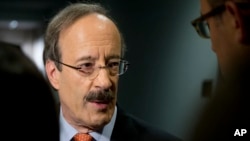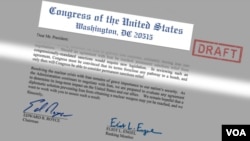As unconfirmed reports surfaced that a draft of an Iran nuclear deal was being circulated among the parties to international negotiations in Switzerland, U.S. lawmakers at a hearing Thursday in Washington seemed to grow increasingly nervous.
Officials told the Associated Press that the U.S. and Iran were drafting elements of a nuclear deal that committed Tehran to a 40 percent cut in the number of machines it could use to make an atomic bomb. In return, the officials said, Iran would get quick relief from some crippling economic sanctions and a partial lifting of a U.N. embargo on conventional arms.
Later in the day, State Department spokesperson Jen Psaki dismissed reports of a deal.
"The reports are inaccurate," she said. "There is no draft document being circulated. The fundamental framework issues are still under comprehensive discussion, and obviously that is what [Secretary of State John Kerry] is focused on now."
Kerry has been in Switzerland this week, meeting with his Iranian counterpart as the United States and its partner countries — Britain, Russia, China, France and Germany — try to reach an outline of an agreement before March 31. The deadline for a comprehensive agreement is the end of June.
Letter to Obama
At a contentious House Foreign Affairs Committee hearing on the Iran nuclear talks, several lawmakers insisted that Congress’ role in the negotiating process must not be marginalized.
Represenative Eliot Engel of New York, the ranking Democrat on the committee, said he and Republican Chairman Ed Royce of California were sending a letter to President Barack Obama expressing their concerns about what needs to be in an Iran nuclear deal.
A draft of the letter emphasizes that permanent sanctions relief, which Iran has repeatedly requested during the Geneva negotiations, would require new legislation.
"In reviewing such an agreement, Congress must be convinced that its terms foreclose any pathway to a bomb," the lawmakers wrote, adding that "Iran's role in fomenting instability in the region ... demonstrates the risks of negotiating with a partner we cannot trust."
A spokesman for Engel told VOA that 363 House members, Republicans and Democrats, signed the letter.
"It’s truly a very bipartisan letter expressing Congress’ strong feelings about things that need to be in the agreement," Engel said during the committee hearing. "Congress really needs to play a very active and vital role in this whole process, and any attempts to sidestep Congress will be resisted on both sides of the aisle [ by both Democrats and Republicans]."
The West has accused Iran of seeking nuclear weapons, but Iran insists its nuclear activity is solely for peaceful, civilian purposes, such as medical research and generating power.
The House letter came after a more controversial letter that was sent to Iranian leaders last week. That letter, signed by 47 Senate Republicans, cautioned Tehran that any deal might not last after Obama leaves office.
"Congressional interference"
Democratic Representative Emanuel Cleaver of Missouri told VOA that he and many other Democrats signed the new House letter because they wanted the deal to be tough and to protect Israel’s security. But Cleaver said he was concerned about what he saw as efforts by some lawmakers to undermine Obama.
“I believe that we have not had this much congressional interference with any kind of major deal, particularly in the area of nuclear armament, in our history," he said.
Deputy Secretary of State Antony Blinken disappointed some on the committee by repeating the administration’s position that Congress should not interfere in the talks at this sensitive phase, and that its role would be to lift sanctions at a later time.
Tensions also flared over what Republicans saw as the Obama administration’s lukewarm response to Israeli Prime Minister Benjamin Netanyahu’s election win. Republican Representative Steve Chabot said, “President Obama clearly has disdain for the winner of the Israeli elections this week.”
That prompted this response by Blinken: “Congressman, in my judgment, no administration has done more for Israel’s security than this administration. If you look at the measures we have taken, the steps we have taken, to provide for Israel’s security ... they are exceptionally extraordinary, and indeed, Prime Minister Netanyahu has called them such.”
Call made to Netanyahu
The White House said Obama called Netanyahu on Thursday to congratulate him on his election victory. Officials said the president told Netanyahu that the U.S. valued its close security cooperation and long-standing partnership with Israel. The issue of U.S. nuclear negotiations with Iran also was discussed, they said, with Obama telling the Israeli leader the U.S. was focused on reaching a comprehensive nuclear deal with Iran.
Some Democratic members say Netanyahu insulted Obama when he spoke to a joint meeting of Congress earlier this month without consulting the White House first. Netanyahu used the speech to warn members of Congress about what he called a bad deal with Iran.
Democratic Representative Gerry Connolly of Virginia said Republicans should not blame Obama, adding that friends do not treat friends the way Netanyahu treated Obama with the recent visit.





